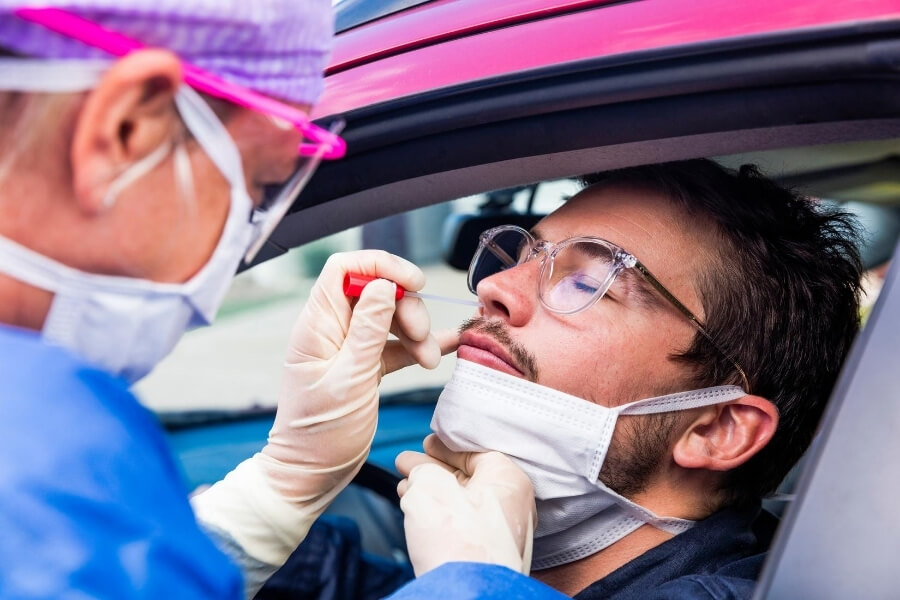Rules applicable from 1 February 2021
Once an incredibly simple process to cross from Dubai into neighbouring emirate Abu Dhabi, the world changed for the Emirates on 22 June 2020 when precautionary health measures saw Abu Dhabi shut off its domestic border with Dubai.
The restrictions have eased, however, a border checkpoint remains in place restricting movement into Abu Dhabi emirate.
All drivers and passengers of private vehicles over the age of 12 must present a negative COVID-19 test result in order to cross from the emirate of Dubai into the emirate of Abu Dhabi, plus undergo subsequent nasal testing if they remain in Abu Dhabi.
There is no restriction on driving from Abu Dhabi to Dubai.
The situation does change on a daily (and sometimes hourly) basis, so we recommend as well as following through our tips here you also check with the relevant Government authorities prior to travelling.
Border testing travelling from Dubai into Abu Dhabi
Here’s what you need to know before crossing from Dubai into Abu Dhabi.
The difference between a PCR and a DPI Coronavirus test
There are two different types of coronavirus testing that are currently accepted for passing the border between Dubai and Abu Dhabi.
In order to cross the police checkpoint that has been set up across the highway, you will need to provide evidence (an SMS screenshot of your test result will suffice) that you are COVID-19 negative. This can be from a PCR or DPI test result.
A PCR is a Polymerase Chain Reaction test – in the UAE conducted via a nasal swab test that takes, on average 24 hours for the results to be returned, though this can vary. You should plan a PCR test at least 24 hours in advance of when you wish to cross from Dubai into Abu Dhabi.
A laser-based DPI test (Diffractive Phase Interferometry) is a pin-prick test on your finger which picks up signals of infection and allows for quicker mass-testing, the result is almost instant.
At present, you are allowed to take either of these two tests in any part of the UAE. From 1 February 2021, you have 48 hours to cross into Abu Dhabi with a negative PCR result, or 24 hours from receiving a DPI result.
You will need to present a photo ID – be it your Emirates ID card (EID) or a passport with your test result, with yout name in Arabic or English.
Rapid testing centre at Ghantoot
So what exactly should you expect crossing Dubai to Abu Dhabi?
Just over the border on the E11 Freeway that connects the two cities, you will come to the area of Ghantoot. If you are NOT already in possession of a negative test result, pull off the freeway here, it will be very clearly signposted.
There are now seperate places to go for:
- Overseas visitors/returning residents with a valid PCR result who need fitting with a tracker (more on this below) and
- UAE residents looking to undertake rapid DPI test, per conditions below
non-UAE residents. They may use a PCR result instead, but be mindful if you’ve come from overseas the result can be no more than 48 hours old.
New overseas arrivals into Abu Dhabi are also subject to strict self-quarantine measures, more below.
You should have the Al Hosn app installed on your phone. The two staff testing you (one entering your details and one actually doing the prick test) will ask you to confirm your mobile number. You will be instantly sent a result which indicators either “no swab” or “swab”.
“No swab”= keep driving, you’ve tested negative. Keep your phone handy as it’s only a few kilometres back on the E11 or E311 Highway until you hit the police checkpoint and will need to show this result.
“Swab” = If a follow-up swab is required, they will do this on the spot (a PCR test) in the testing tent.
We have heard varying stories on whether you are then allowed to cross the border and self-quarantine while you wait for the result. It appears some leniency being shown with families who live in Abu Dhabi and can prove their residency, otherwise expect to be turned back to Dubai until a PCR confirms whether you are actually positive or not – a PCR is far more accurate than a DPI test which may pick up other infections.
The E11 Highway from Dubai to Abu Dhabi has now been widened at the border checkpoint with many more lanes to speed up the border crossing process; it includes automatic number plate reading.
To add one more layer of complication, if someone is borrowing your vehicle (even if it’s your spouse who ordinarily drives the vehicle), be warned the police system may assume it is you, the owner that has crossed the border. You may receive the day 4/8 warning by text or a flat out fine for not re-testing even if you yourself never crossed the border!
Testing in advance of border crossing into Abu Dhabi
If you are unable to get a rapid DPI testing appointment at the border, or you’d rather not chance being turned away if it’s busy, you should get your PCR or DPI test performed in advance, in any emirate.
The SEHA App will give users access to booking a PCR or DPI at any of the designated Government testing centres around the UAE. These may also book up well in advance of weekends and public holidays so you should plan your trip carefully.
Results from private testing labs at hospitals and clinics in the UAE can also be accepted. These may cost more than using the SEHA service (though in our experience, many of the private labs are now cheaper – eg 85 AED). Emirates shares this list of approved testing centres in Dubai.
What happens next – subsequent testing in Abu Dhabi
The rules on subsequent testing once you are in Abu Dhabi Emirate have changed numerous times. The latest iteration of the rules applies from 1 February 2020.
Entering Abu Dhabi on a PCR test? You will need to be re-tested by PCR if you stay in Abu Dhabi 4 consecutive days, and again on day 8 if you stay 8 consecutive days.
Enter Abu Dhabi on a DPI test? You will need to be re-tested by PCR if you stay in Abu Dhabi 3 consecutive days, and again on day 7 if you stay 7 consecutive days. You cannot use a DPI on consecutive border crossings.
If you fail to do so, you will be fined.
The exemption to this is residents who have completed their vaccinations and can show an E on their Al Hosn App (which requires a PCR test to have been taken in the 7 days prior). Likewise, vaccine trial participants can show a Gold Star, activated on the Al Hosn app for 7 days after having taken a PCR test.
Arriving into Abu Dhabi from overseas
Update from 24 December 2020, amended from 1 February 2021
If you are a new arrival into Abu Dhabi from overseas (whether Resident visa holder or a tourist) these rules apply:
- Passengers must present a negative COVID test result (valid within 96 hours – 72 hours from UK) before boarding a flight to AUH (Under 12’s and those with disabilities are exempt).
- On arriving into Abu Dhabi you will be given a further PCR test.
- Quarantine requirements will depend on the country of origin. A tiered system has been introduced:
- Visitors from “Green List” countries will be exempt from quarantine, once they get a negative COVID test result on arrival, this may take 24 hours. Testing is required again on Day 6.
- All other visitors into AUH must self-quarantine for 10 days, either in a private home, hotel or accommodation provided by the authorities. Testing is required again Day 6 and Day 12 if staying 12+ consecutive days.
- To ensure adherence to self-quarantine rules, new arrivals into AUH from designated countries are fitted with a tracking wristband (colloquially nicknamed the “Abu Dhabi Rolex”)






